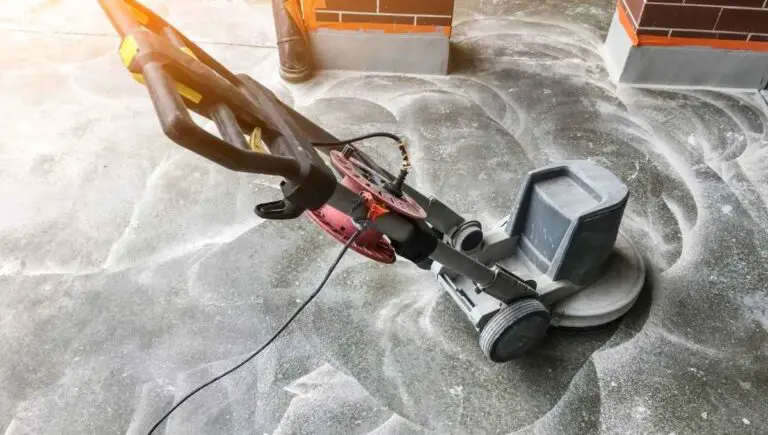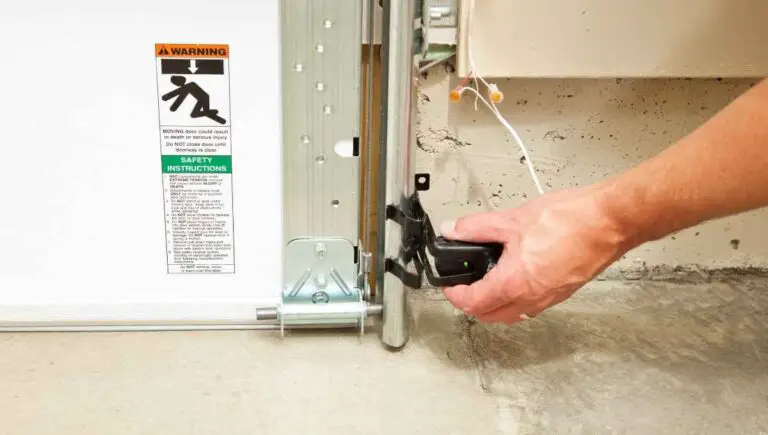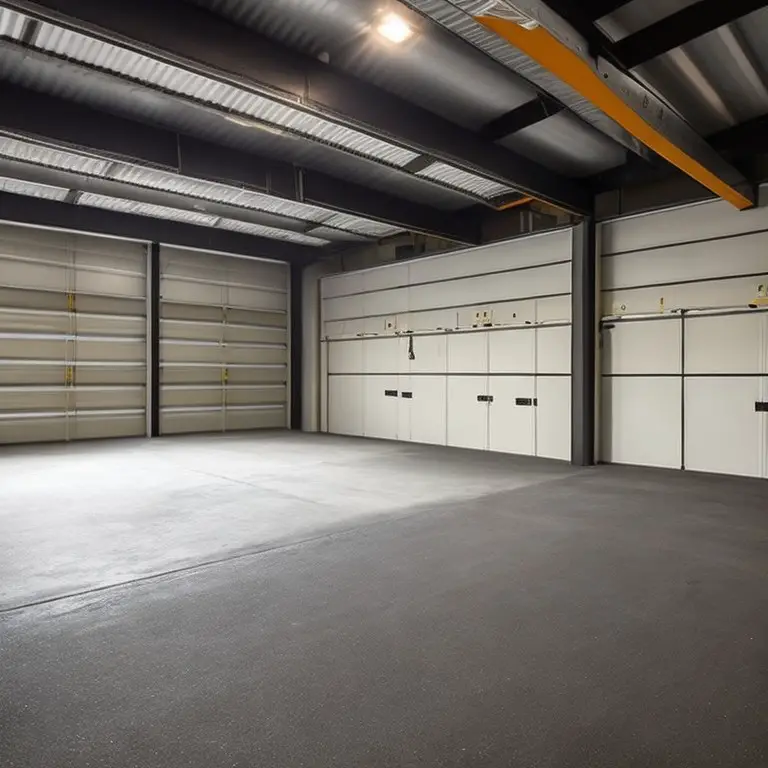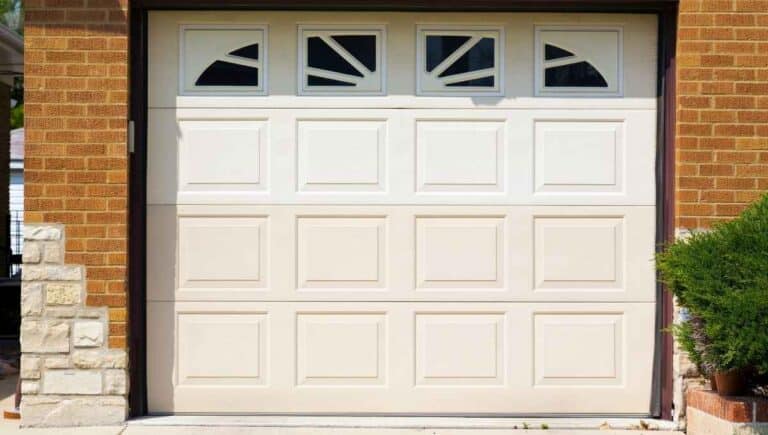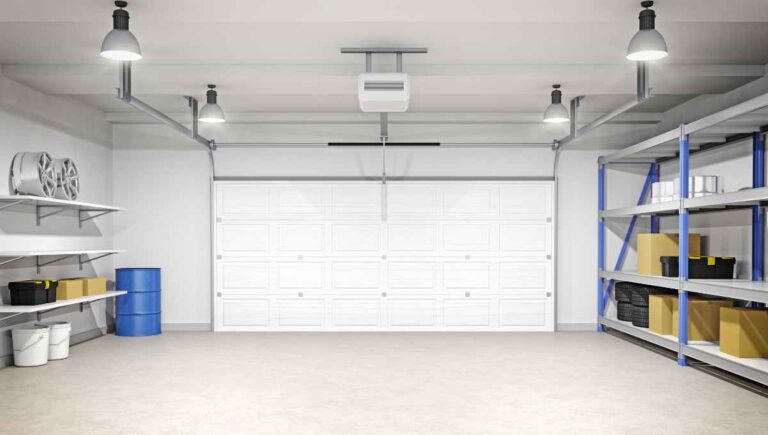Does a Garage Need a Foundation? (Building Codes & Rules)

Building a garage is a significant investment, and it’s important to make sure it is constructed properly to ensure its longevity and stability. One question that often arises when building a garage is whether it needs a foundation.
A garage typically needs a foundation. A solid foundation helps to keep the garage level and stable, and it also provides a barrier between the ground and the structure to prevent water damage and insect infestation.
Foundations don’t have to be daunting. In this article, we’ll explore various foundations and explain why they’re so important. So stick with us for a base knowledge you’ll be glad you built!
This post contains affiliate links. This means Household Blogger may earn a commission should you make a purchase using any of our links. Please refer to our full affiliate disclosure policy for full details.
Here’s a Quick Pro Tip!
Having a strong foundation is vital to a successful building. Without a foundation, your garage will not pass inspection and may be condemned and torn down. So if you pour a foundation, you might as well do it the right way.
There are some of our must-haves for your next foundation project:
1. Concrete Mixer – Ensures your concrete is correctly mixed before pouring.
2. Masonry Set – All the tools you need to ensure your new concrete is smooth and perfect.
3. Sealant – Make sure that your concrete stays in top shape.
Foundations
A solid foundation helps ensure a building stands strong for many years. Of course, not all buildings have to have a foundation to remain standing, but most do. So, let’s discuss what buildings need foundations and why.
Should a Garage Have a Foundation?
A garage should always have a foundation to ensure a safe and stable structure. Without a foundation, there is insufficient grounding, and the building may not be structurally sound.
This is just one reason there are so many building codes surrounding garages. These codes are in effect to ensure that garages are safe to use. After all, while some people use garages to park their vehicles, others do lots of work there, and they need to be safe.
Can You Build a Garage Without a Foundation?
You cannot build a garage without a foundation because it will not be structurally sound enough. Without a foundation, you risk the entire garage collapsing due to a lack of support.
Additionally, without the proper foundation, you cannot risk putting anything heavy on the floor of your garage. Without the support of a foundation, your vehicles may end up sinking, especially if you live in a wet or sandy environment.
How Deep Does a Foundation Need to Be for a Garage?
A garage’s foundation slab needs to be at least four inches thick, thicker if the garage is larger than two cars. This depth ensures the foundation is stable enough to hold up the building’s supports without cracks.
Without the structural support of a good, deep foundation, your new garage may buckle under its own weight. In addition, if your garage foundation isn’t deep enough, it may crack easily. If you don’t fix the cracks immediately, they may become a big issue.
What Is the Best Foundation for a Garage?
Concrete is the standard foundational base. It’s strong but not overly expensive, and it can withstand temperature fluctuations and the weight of vehicles and other objects you may choose to store in your garage.
Not to mention, concrete is considered easy to work with. It cures within a couple of days, making it a quick way to ensure your building has a secure foundation. Plus, it’s easy to fill in any pesky cracks that may form.
How Do You Lay a Foundation for a Garage?
To properly lay a foundation, you need to start by removing the topsoil and smoothing out the garage area. Then, dig out where the footings will be. Finally, pour the concrete or other foundational materials.
You may decide to take extra steps in between those basics, however. For example, you may decide to add a moisture barrier (sometimes called a vapor barrier) underneath the foundation or add rebar to the concrete for extra stability.
You might also enjoy our post on Where a Garage Floor Drain Goes
Slabs for a garage
Adding a slab of concrete to the base of your garage is vital to ensuring that your new building is stable and suitable for storage or work. But that may leave you with many questions about what is necessary for your garage. So let’s talk about it.
What Kind of Slab Do I Need for a Garage?
Most garages need concrete slabs at least four inches thick to be up to code and safe for public use. You may also need additional footings to ensure that your building is up to code.
Building codes are there to ensure that your building is safe. This is also why you typically need to get permits and planning permission from your local government before attempting to build a property structure.
How Much Does It Cost to Pour a Concrete Slab for a Garage?
The cost of pouring a concrete slab is usually the cost of the concrete itself, plus labor and materials for whoever is doing the work. This usually costs about five dollars a foot, so a two-car, 24×24 foot garage would be just under $3,000.
Of course, depending on the cost of materials and where you live, this number could be higher or lower. No matter what, having a concrete slab is a vital part of your garage, and you shouldn’t overlook it!
How Thick Does a Concrete Slab Need to Be for a Garage?
If you’re using a concrete slab as the foundation for your garage, you need it to be at least four inches thick. Any thinner and it may not be structurally sound, and you may experience problems with your walls buckling.
This is just one reason garages require foundations and many cities require planning permits and permissions for building a garage. Building codes aren’t just for government bureaucracy; they’re there to keep you safe.
Does a Garage Slab Need Rebar?
Depending on the garage’s size and how thick the concrete slab is, rebar isn’t strictly necessary, though it is often suggested. Rebar helps shore up concrete, ensuring that your foundation is solid.
While rebar may not be strictly necessary, if the PSi of your concrete is on the lower end of acceptable, adding in some rebar may be wise. It will help your garage floor in supporting the structure.
How Much Weight Will a Four-Inch Concrete Slab Hold?
Every inch of a four-inch slab of concrete can hold about 40 pounds. If you need your foundation to hold more, you’ll want to add reinforcement, such as rebar, to ensure it won’t crack under pressure.
If you intend to use your concrete slab to hold heavy vehicles, such as cars, trucks, or even large tractors, you need to ensure that the concrete can hold the weight of said vehicles. If in doubt, reinforce it!
Under the Foundations
If you’ve never been responsible for building a garage from the ground up, you probably have a number of questions. A big one is, what do you need to do to build a solid foundation? We’re going to tell you right now!
Can You Pour Concrete Directly on Dirt?
You won’t want loose dirt directly under your concrete. Instead, you should prepare the ground by thoroughly packing down the dirt. You may also want to add a layer of concrete or another aggregate to ensure the concrete is solid.
If you choose not to use aggregate, you can pour the concrete directly on the packed soil. You may want to reinforce the concrete with rebar if you’re not using aggregate as a way to ensure the concrete is strong.
Do I Need Gravel Under Concrete?
As long as the soil underneath where you plan to put concrete is packed down and smooth, you do not have to use gravel underneath. However, having the gravel can help with water dispersion.
If you don’t want to deal with gravel, consider using a vapor barrier instead. Vapor barriers are typically plastic sheeting that helps protect your new concrete by putting a barrier between the wet ground and the susceptible concrete.
What Happens if You Don’t Put Gravel Under Concrete?
Concrete without gravel underneath is more susceptible to water damage and cracking. In addition, concrete is relatively porous; if water is allowed to pool under it, damage can occur more quickly.
This is why most people use a vapor barrier or gravel between the packed soil and the concrete. However, if you want your concrete to last longer, you should seal it and ensure that there is gravel underneath.
What Can You Put Under Concrete Besides Gravel?
If you want to protect your new concrete but you don’t want to put gravel down under it, you can use other types of aggregate or small crushed rocks. You can also put vapor barriers or other plastic sheeting down.
Using some type of aggregate is important because it helps draw moisture away from the porous concrete. However, if your concrete isn’t going to be subjected to a lot of water, you can go without anything under it.
Other Necessities
So, now that we’ve discussed foundations and slabs, let’s dig into some other common questions surrounding building a new garage. After all, what good is a foundation if you don’t build on it properly?
Can You Build a Garage Without a Footing?
Your garage does not need footings unless you’re building on a steep slope or have very poor soil conditions. Footings are there to help provide structural support but aren’t always necessary.
Detached garages often forgo having footings because of their ability to be moved if necessary in the future. Additionally, the smaller the building, the less likely it is to need a footing, so small garages are in the clear.
You might also enjoy our post on If You Can Replace Garage Door Window Inserts
Does a Garage Foundation Need Rebar?
The foundation does not need rebar if you plan to use your garage to store your vehicle or other common possessions. However, if you are keeping very heavy materials on the floor, you may want to consider reinforcing them.
Rebar can help you shore up an unstable garage floor. It is recommended that you add rebar to projects that use more than five inches of concrete to provide extra stability. However, the foundation of most garages only requires four inches of concrete.
Do You Need to Waterproof a Garage Foundation?
It is vital that your garage foundation is waterproof. You can do this by adding a vapor barrier and gravel before you lay the foundation. You should also seal the concrete once it’s set and cured.
While it’s not always in a building’s code that it has to be waterproof, it’s still incredibly important this step isn’t skipped. Waterproofing concrete can help prevent the foundation from cracking over time, lengthening your garage’s potential lifespan.
What Are the Requirements for an Attached Garage Foundation?
Each state has its requirements for building projects, but in general, attached garage foundations are required to have specific footings, framings, and inspection schedules.
For example, in Minnesota, an attached garage needs to be inspected before concrete is poured, after framing has been completed, and upon completion of the project. They may also ask for additional inspections depending on the outcome of the early ones.
Does a Detached Garage Need a Foundation?
Regardless of whether a garage is attached or separate from a home, it needs a sturdy foundation. Garages are large enough that soil alone will not keep them steady. Instead, they rely on a foundation to keep the walls and ceiling from buckling and falling.
Without a solid foundation, you risk your new detached garage collapsing under its own weight. In addition, garages found to be built without foundations are likely to be condemned if discovered.
You might also enjoy our post on Can I Vacuum My Garage?
Related Questions
Is It Cheaper to Pour Your Own Concrete?
If you purchase, mix and pour your own concrete, you will likely save money versus hiring someone. Because professionals will charge you for labor and materials, pouring the concrete can be expensive.
However, you’re also purchasing their years of experience with that money. If you have poured concrete before and are confident in your abilities, you can save money by doing it yourself. However, if it’s not done correctly and doesn’t pass inspection, you’ll spend even more money in the future to have a professional come and fix it, so choose carefully.
What’s the Difference Between Cement and Concrete?
Cement is an ingredient in concrete. It typically makes up about ten percent of a concrete mix. As a result, cement is often mistaken for concrete but won’t ever be the sole component in a sidewalk or foundation.
What you may think of as cement is always a concrete mixture that probably has some cement within it. Concrete is actually comprised of aggregate (typically gravel) and a cement and water paste.
Which Is Stronger, Concrete or Cement?
Concrete is just a mixture that contains aggregate and a paste, typically made from cement and water. Thus, concrete will always be stronger than cement, as it’s made of cement.
Cement is often used in concrete to help make it stronger, but it’s quite susceptible to cracking on its own, which is why it’s not often used alone. This is why you want to use concrete in a foundation.
Final Thoughts
A garage needs a strong foundation to withstand the test of time. If your garage is on flat land, you can use concrete for the foundation. However, if your soil is poor or your land has a strong slope, you’ll need to reinforce the foundations with rebar or footings. Either way, we hope this article helps you and your next building project!






